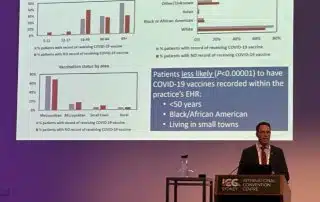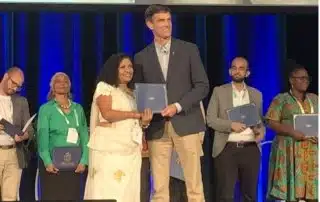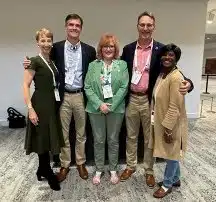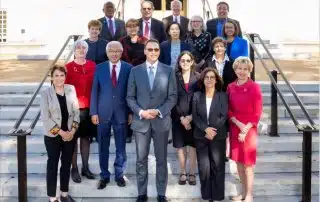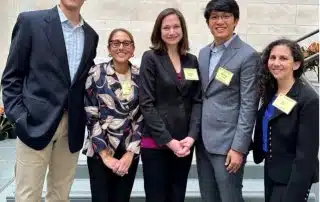Happy Holidays!
This past quarter has been quite busy, with lots of happenings to share!
Bob Phillips and Andrew Bazemore present to national policy audiences in Australia, take part in WONCA World Conference 2023
After three years of pandemic delay, the Royal Australian College of General Practitioners (RACGP) hosted the WONCA World Conference 2023, celebrating the 50th anniversary of the inauguration of WONCA where it all began…in Australia.
Bob and Andrew both traveled to Australia to represent the CPV at this event, giving talks to national policy audiences in support of primary healthcare prior to the conference.
Bob was interviewed by the RACGP’s newsGP, the national publication for general practice news, picked up by many of the attendees of the conference. Read the interview here.
Bob and Andrew also visited Canberra, the nation’s capital, with longtime Family Physician leaders and friends of the ABFM & CPV. There they met and gave presentations on efforts to reform Primary Health Care in the US to both state and federal leaders in charge of national primary care strategy development and implementation.
Both Andrew and Bob attended WONCA Research Interest Group meetings, where Bob became the representative of the North American region. In addition to presentations, they also reconnected with past visiting fellows and research colleagues, and birthed several new global Primary Health Care (PHC) projects.
Andrew interviewed all of the ABFM Foundation funded Montegut Scholars as part of an evaluation of that program, before presenting each with certificates at the WONCA Awards ceremony with ABFM past Board Chair Dr. Lauren Hughes.
Finally, they were able to support the election of the first American WONCA president-elect in two decades, ABFM diplomate and colleague Dr. Viviana Bianca-Martínez.
Bob Phillips Presents at the Inaugural Alliance for Primary Health Care in the Americas Regional Forum, Montevideo, Uruguay, December 4-6
Despite having high level delegations from nearly every HHS agency and more than 20 countries, the Essential Role of Primary Health Care for Health Security and Securing Health Conference did not result in the secretary of HHS producing the long-anticipated Action Plan for Primary Health Care. Instead, HHS produced an Issue Brief and National Academy of Medicine perspective that took stock of the many efforts launched by the Action Plan efforts across HHS, and a commitment to produce a national HHS Dashboard for Primary Care. Despite this, in November, PAHO, the World Bank, the Inter-American Development Bank, US State Department, and USAID launched the Alliance for Primary Health Care in the Americas and The World Bank – PAHO Lancet regional health Americas commission on primary health care and resilience in Latin America and the Caribbean. Bob was asked to present at the conference in Montevideo, Uruguay where the national PHC Dashboard idea was a hit. We hope to engage HHS around this PAHO effort, even as we pivot to a congressional effort to realize a national infrastructure for PHC in the US.
National Academy of Medicine Annual Meeting
Both Bob and Andrew attended the annual NAM Meeting. Bob and the NAM Membership Committee welcomed 100 new members! While there, Andrew was able to spend time with our 2022-2023 Puffer Fellows.
Primary Care Collaborative Summit
In November, Bob and Andrew attended the Primary Care Collaborative Annual Summit, where Bob helped present the first ever David Meyers Research Award, sponsored by ABFM and the American Board of Internal Medicine.
Bob Featured in Washington Post High-Profile Article
Bob was interviewed for this high-profile article in the Washington Post, Primary care saves lives. Here’s why it’s failing Americans. Without patients having access to primary care, minor complaints evolve into chronic illnesses that demand complex long-term treatment plans. Addressing basic patient problems in the emergency room costs up to 12 times what it would in a primary-care office, resulting in billions of additional dollars each year. The problems undermining primary care were exacerbated by the coronavirus pandemic, according to a report by the Commonwealth Fund, but the erosion had been underway for years.

Welcome to the Team, Latrice Williams!
Latrice comes to us with over 15 years of experience in Administrative Support, Customer Service and Government Services. She is originally from Florida and currently lives in the suburbs of the DC Metro Area in Virginia. She has joined as a part-time Administrative Assistant that will support the Center for Professionalism and Value in Health Care. Outside of work, Latrice enjoys reading, making silly jokes, and spending time with time with friends and family.
Comparison of Associations of Household-Level and Neighborhood-Level Poverty Markers with Pediatric Asthma Care Utilization by Race/Ethnicity in an Open Cohort of Community Health Center Patients
Lucas JA, Marino M, Bailey SR, Hsu A, Datta R, Cottrell E, Kim YJ, Suglia SF, Bazemore A, Heintzman J.
This study investigates the relationship between poverty measurements (household-level and neighborhood-level) and asthma care utilization outcomes among Latino, non-Latino black, and non-Latino white children in a community health center context. Using electronic health record data from 2012-2017, the study found that neighborhood poverty (<100% federal poverty level, FPL) was linked to increased asthma visits, while residing in a low-income neighborhood (≥100% to <200% FPL) was associated with more albuterol prescriptions. Variations in these associations were observed among racial/ethnic groups. The study underscores the importance of considering both family and community poverty indicators when assessing the relationship between economic status and healthcare utilization, potentially aiding in tailored asthma care and reducing disparities in primary care safety net settings.
Defining comprehensiveness in primary care: a scoping review
Baughman D, Nasir R, Ngo L, Bazemore A
This scoping review unified the interrelatedness of comprehensiveness main aspects – whole-person care, range of services, and referral to specialty care – framing a working, evidence-based definition: managing most medical care needs and temporarily complementing care with special integrated services in the context of patient’s values, preferences, and beliefs.
The Digital Health Divide for Populations that have been Marginalized
Everson, J, Patel V, Phillips B
Many hospitals have adopted systems for interoperable patient data exchange and are connected to national networks. However, ONC has consistently found that rates of interoperable exchange for smaller, rural, and independent hospitals have notably lagged behind other hospitals. For example, in both 2017 and 2021, rural hospitals were 23 percentage points less likely to engage in interoperable exchange compared to urban hospitals. In a recent study, ONC explored this digital divide to better understand the relationship between interoperable exchange and measures of hospitals that served populations that have been marginalized.


